Walk the Line
 for some language, thematic material and depiction of drug dependency.
for some language, thematic material and depiction of drug dependency.
Reviewed by: Chris Monroe
STAFF WRITER
| Moral Rating: | Average |
| Moviemaking Quality: |
|
| Primary Audience: | Adults |
| Genre: | Biography Music Drama |
| Length: | 2 hr. 15 min. |
| Year of Release: | 2005 |
| USA Release: |
November 18, 2005 (wide) DVD release: February 28, 2006 |
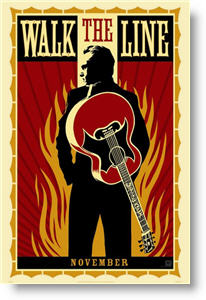
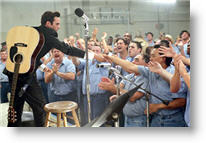
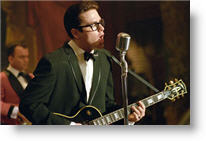
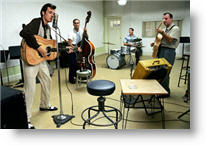
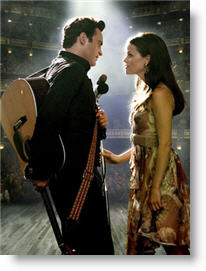
How can I deal with temptations? Answer
Should I save sex for marriage? Answer
What are the consequences of sexual immorality? Answer
| Featuring |
|---|
|
Joaquin Phoenix Reese Witherspoon Ginnifer Goodwin Shelby Lynne Robert Patrick |
| Director |
|
James Mangold |
| Producer |
|
Cathy Konrad James Keach |
| Distributor |
Here’s what the distributor says about their film: “He picked cotton, sold door to door, and served in the Air Force. He was a voice of rebellion that changed the face of rock and roll. An outlaw before today’s rebels were born—and an icon they would never forget. He did all this before turning 30. And his name was Johnny Cash. WALK THE LINE explores the early years of the music legend, an artist who transcended musical boundaries to touch people around the globe. As his music changed the world, Cash’s own world was rocked by the woman who became the love of his life: June Carter.
The story begins in Depression-era Arkansas, tracing the origins of Cash’s sound back to his beginnings as a sharecropper’s son; moves through his wild tours with rock and roll pioneers Elvis Presley, Carl Perkins, Roy Orbison, Jerry Lee Lewis and Waylon Jennings; and culminates in his unforgettable 1968 concert in Folsom Prison. He became the hottest artist of the day, outselling even the Beatles. WALK THE LINE chronicles the birth of a new kind of American artist who had to move past raw anger, the ravages of addiction, and the temptations of stardom to discover the voice that would make him a hero to generations. Those early years encompass the themes that ran through Cash’s music and minimalist style: death, love, treachery, sin, hope and faith.”

Director James Mangold explains that he sees three main threads running through his biography film about real life “Man in Black” Johnny Cash. “Walk the Line” focuses primarily on Johnny Cash’s music career, his bout with drug abuse, and his romantic love with fellow musician and eventual wife June Carter. The story is a rather rigorous one, emphasizing Cash’s struggle with various addictive substances, but does manage to provide a glimpse into the redemptive work that finally works itself out in his life.
Beginning and ending with Johnny Cash (Joaquin Phoenix) performing his famous Folsom Prison concert, the rest of the story is primarily a flashback of how this rough-and-tumble musician began his career and helped shape the face of country music as we know it today. Not shying away from his broken marriage or his lengthy struggle with drugs and alcohol, the story also includes such positive aspects as how he was discovered as a musician and how he found a love that helped lift him out of the mire. The film ends in 1968, but in some respects Johnny Cash’s life was only just beginning.
As the scriptwriter and director for the film, James Mangold defended his reason for choosing to tell about this particular time of Johnny Cash’s life because, as we know, story has to be about conflict. Mangold describes this time of Cash’s life as the time when he was pushing God away and basically destroying himself. Throughout the whole film we see him in conflict with his dad, with his first wife, with June Carter (Reese Witherspoon) and even with himself. It isn’t until the end then that we finally see his life being restored.
Included in the film are a few situations that one may want to be aware of. Many scenes show Cash popping pills and drinking alcohol, as well as bumbling around under the influence of these substances. There are a few instances of foul language, including the Lord’s name being taken in vain and the use of the f-word. John is also alluded to having affairs with girls while on tour, and sleeps with June while he is still married to his first wife, Vivian (Ginnifer Goodwin). There is no nudity, but this film unapologetically details the failures and foibles of this man’s life.
Before Cash’s fame and success, his life was quite innocent and pure. He and his wife Vivian struggle to make ends meet while John works various jobs and plays music with his friends on the side. The music he first learns and plays is Gospel music, inspired perhaps by the hymnal his mother gave him, which he also familiarized himself with while growing up. Gospel music is also what he first plays when he auditions for a record producer the day he is discovered.
However, the music that made Johnny Cash famous was not Gospel music, initially. When Johnny Cash and his band audition for record producer Sam Phillips (Dallas Roberts) with a song about how Jesus saved his soul, Phillips tells him that he doesn’t believe John when he sings it. Phillips tells John that Gospel music is not selling, and that he wants him to sing something that is “real” because that is what is going to sell. So, John changes his tune, literally. Phillips also adds that it’s not about God, but about believing in yourself. This makes me wonder, if things did happen just like this, how Johnny Cash’s life would have been different if he had decided to stick with Gospel music.
It is also well known that John’s faith in God and in Christ Jesus had the biggest impact on his life, and is what helped turn him around for good. This critical aspect is somewhat inferred, but it seems to be overshadowed by the emphasis placed on John and June’s love for each other. Mangold said that he thinks it is June that ultimately saves John’s life. But following the turning point where June rescues John out of the lake, the two are shown attending a church service.
The acting and singing are quite impressive in this biography picture. Since so much is known about Johnny Cash, and since people are so familiar with his voice and music, the task of portraying him is quite daunting. Phoenix faithfully executes various nuances of Johnny Cash, as does Witherspoon in portraying June Carter—and both sing their parts excellently. Mangold explains that he sees a great asset in having the actors sing these parts (instead of using a voice double) because this way the actors have an outlet to express so much more of their characters.
Read our interview with WALK THE LINE’s director and actors Joaquin Phoenix, Reese Witherspoon and others
“Walk the Line” is a real life, honest look at Johnny Cash’s life. It has it’s entertainment, as well as a heavy dose of scenes about drugs. The performances are great, but the lack of focus on John’s spiritual life, specifically with his faith in Christ, is disappointing. Overall, though, it is a redemptive story.
- Language: Moderate
- Violence: Mild
- Sex/Nudity: Mild
See list of Relevant Issues—questions-and-answers.


Good / 5
Better than Average / 4½
Average / 4½
The actors used their own voices in the film and it makes it more entertaining knowing they went the extra mile to give the film a sense of realism, this feat was not easy, as to my knowledge neither actor has had any musical/singing background before they started this project. Language is kept on the light side, and there are issues dealing with drug dependency, but this is essential in telling the story. All in all a great film that will entertain most mature teens and adults alike. You don’t have to be a fan of country music or Johnny Cash to appreciate this film. Go and see it, I think you’ll be glad you did!
Better than Average / 5
Good / 5
Average / 4½
Yes, this film does portray adultery, drug abuse and foul language. But none of them are shown as being desirable or worth emulating. I must say I was incredibly how impressed the two lead actors did their roles. It’s one thing to play a historical character, it’s quite another to play people anyone seeing this film will be familiar with. They both pulled it off quite well, even the music.
Better than Average / 4½
I didn’t expect a Hollywood movie to actually endorse a Christian lifestyle, and this one does shy away from it. So I can’t give it an Excellent moral rating. But it was good. I will let my son see it when he is on the edge of becoming an adult, as an object lesson in what happens when one of us turns from God toward sin in any of these forms. Finally, as many others have mentioned, the acting was superb. I am not a fan of Phoenix or Witherspoon. But they captured the essence of Johnny and June. My wife thought their voices were accurate as well, though I disagreed on his. While Phoenix definitely has good pipes, he never convinced me I was listening to Johnny. But that is probably unfair, because that is one voice that I have never heard duplicated.
Good / 4½
I was interested in the choice of songs and why the movie suddenly ended after two hours of tension and heartbreak during a hoped for final happy moment. After all, we sweated with John during his drug dependency, and we yearned with June over her inner turmoil and divided loyalties, and then the story was done. I would have liked to have seen more of the Carter family influence and what happened inside the church Johnny and June were seen approaching after he had gone “cold turkey” with her help and with her parents “riding shotgun.” One more triumphant song would have been perfect, but it was a good experience and I want to see it again.
I WILL buy it when it goes DVD with extra scenes, and want my kids to see it when they reach teen age! One “f” word late on, no nudity, implied sex during adulterous behavior, heavy drinking. Good flick, with a message!
Better than Average / 4
Good / 5
The story actually ends with John and June getting engaged, so perhaps the spiritual growth parts of their lives probably came after that… but I was always under the impression that she led him to the Lord, or back to the Lord. This film does show her influence, but it really looks like SHE was his salvation, and not the Lord. It is based on his book, and they did approve the script, so I guess that means it is pretty acurate.
What this story is really about is how they met and fell in love and it is not a good story in the sense that he was married at the time and they clearly did some wrong things… making the road to their union a very rocky one that messed up many lives along the way. And yes… this is yet another movie about a celebrity who got messed up with drugs and booze and sex before getting his life in order. We’ve seen it in films about Elvis, Ray Charles, Judy Garland… and even Loretta Lynn in Coal Miner’s Daughter, which is still probably the best one in this genre. So what makes this movie worth seeing? Easy. Joaquin Phoenix and Reese Witherspoon. They are both very good actors…
Average / 4
Johnny Cash, throughout his life, identified with, and felt more comfortable in the company of, prisoners and “sinners.” This was the case before and after his “redemption” through June’s love. Not mentioned in earlier reviews here is salvation Cash achieved through divorcing his first wife. Clearly the young Johnny and Vivian did not marry well and all suffered for it. We all make mistakes. Some choose the wrong spouse. Some choose to soothe their psychic wounds by abusing drugs and alcohol. Some break the law. All deserve our respect and compassion. This for me is the message of “Walk the Line.”
Better than Average / 4
Excellent! / 5
As for the quality of the movie, it is excellent. You really feel like you are sent back in time to observe the musician’s life. The film moves through the thirties to the sixties, without missing a step. The music is fantastic of course. There are three or four instances of swearing, but no where near what appears in regular movies today. I would highly recommend this movie to anyone with an interest in music or who likes historical movies.
Better than Average / 5
We all go through hard times, and we question our faith and sometimes even stray a little, bad things happen and we feel like we’re falling and there’s no hope, but everything in your life has a purpose, the bad things and the mistakes leave you needing something, that something is Jesus in your heart and God watching over you.
Better than Average / 5
Better than Average / 5
Average / 5
The acting/singing in this movie were absolutely amazing! Whenever I hear Phoenix say “hello I’m Johnny Cash” it gives me tingles! I would not recommend this to anyone under 13 or 14; it is a serious movie that kids under that age would not appreciate. There is some innuendo as well as swearing.
I am definitely going to see this movie again and maybe buy it when it comes out! Excellent movie, you don’t want to miss it!
Offensive / 5
Average / 3
Average / 5
Very Offensive / 4
Average / 4
Good / 5





If you are expecting a glorious representation of a wonderful man, then you will be watching the wrong movie. Wonderful YES, Glorious NO! This is the story of a man who was blessed by God with a gift of bringing music to life, though conviction and experience. Being raised by an incredibly Godly woman and a father who blames him for his brother’s death, Johnny Cash sets out to find out who he is in life by joining the military and pursuing him dreams. He knows one thing, and that is that he loves music, God and his high school sweetheart who end quickly marries.See all »
My Ratings: Offensive / 5